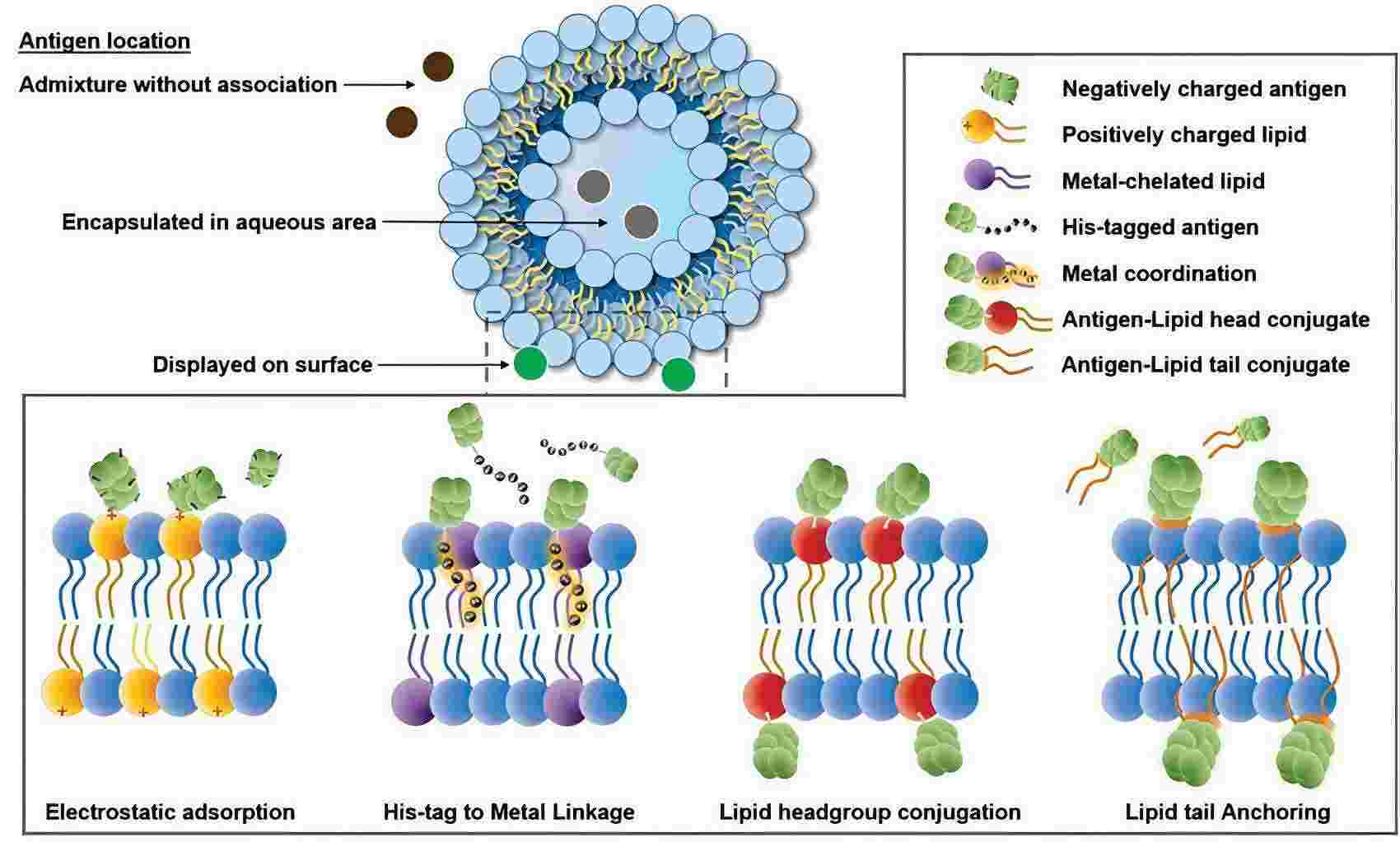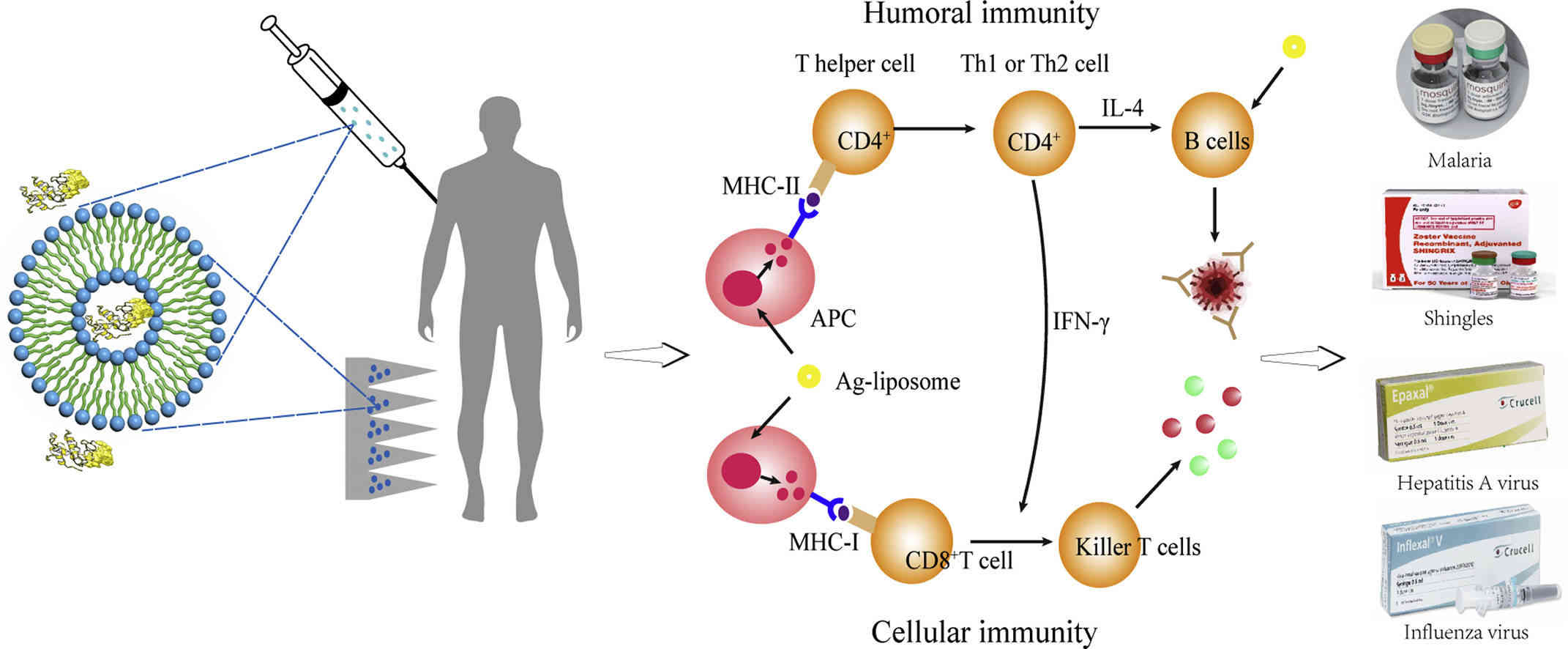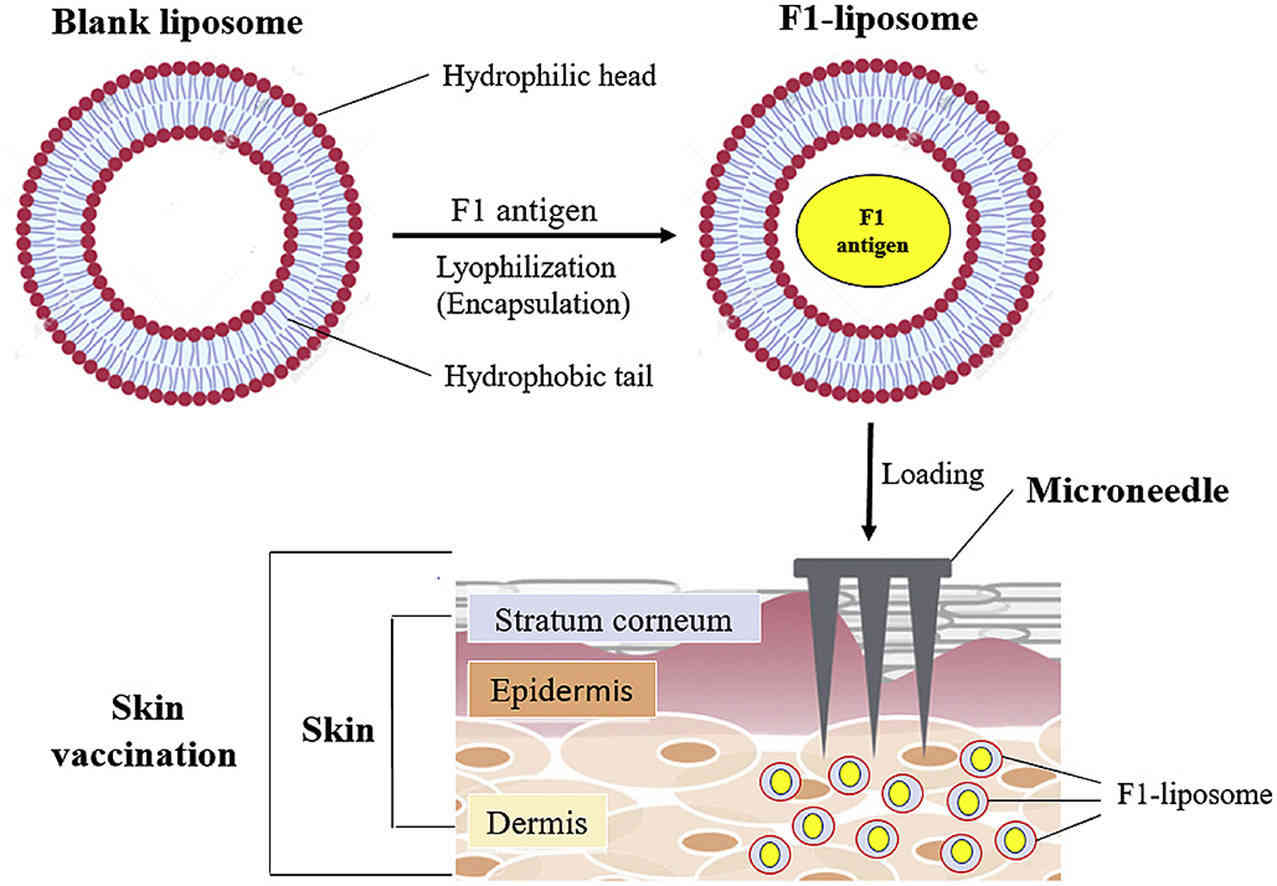Liposome-Based Vaccine Delivery System Development
Inquiry
In recent years, liposomes have evolved into highly multifunctional vaccine adjuvant delivery systems (VADS), driven by the integration of innovative immune mechanisms. By incorporating immune enhancers and targeting molecules, liposomes can precisely target immune cells and organelles, facilitate lysosomal escape, and promote antigen cross-presentation. These advancements significantly boost vaccine efficacy and elicit strong immune responses. At CD Formulation, we focus on developing state-of-the-art liposome vaccine delivery systems to support groundbreaking research and development efforts for enterprises and institutions. Our expertise enables the creation of highly efficient systems designed to enhance vaccine performance and innovation.
 Fig.1 Modes by which antigens can be captured by liposome, including four types of surface display. (Zhou, Shiqi, et al, 2023)
Fig.1 Modes by which antigens can be captured by liposome, including four types of surface display. (Zhou, Shiqi, et al, 2023)
Importance of Liposome Vaccine Delivery System Development
In fact, vaccine delivery systems constructed using nanocarriers have been proven to achieve a variety of functions, including effectively protecting antigens from premature degradation, maintaining component stability and prolonging release time, targeting drugs to specific antigen-presenting cells (APC), and enhancing the immune stimulating effects of vaccines to fully utilize the biological activity agents and reduce dosage. Since their discovery in the 1960s, liposomes have been widely used in drug delivery systems (DDS) or VADS due to their excellent biocompatibility, diverse loading methods, large capacity for drug loading, and ease of preparation and surface modification. Additionally, as a type of VADS, liposomes are suitable for various administration routes, such as intramuscular, subcutaneous, oral, intranasal, and other local administration methods. It is worth noting that liposomes have long been proven to have innate adjuvant effects, exhibiting the lowest degree of reactogenicity compared to other adjuvants, thus greatly reducing the likelihood of inducing hypersensitivity reactions in immune subjects.
 Fig.2 Liposomes used as a vaccine adjuvant-delivery system: From basics to clinical immunization. (Wang N, et al, 2019)
Fig.2 Liposomes used as a vaccine adjuvant-delivery system: From basics to clinical immunization. (Wang N, et al, 2019)
Our Liposome Vaccine Delivery System Development Services
Screening Study of Liposome-based Vaccine Delivery Systems
We are committed to investigating strategies for targeting immune cells, specifically dendritic cells (DC), using mRNA-encapsulating nanoparticles. Our research focuses on enhancing liposomal delivery systems to facilitate optimal delivery for our clients.
Research on Quality Analysis
We offer a systematic liposome delivery system quality research service to standardize the quality of the final product, including quality control of the raw drug, including identification, purification, content, physical state (integrity), purity, and safety quality attribute assessment, and quality control of the final formulation, including stability, content, and related substances. During the formulation evaluation process, we will consider both in vitro and in vivo data to thoroughly assess the quality of the final products.
Our Capabilities in Advanced Liposome Vaccine Delivery Systems
| Techniques and Platforms |
Specifics |
| Liposome-based Vaccine Delivery Platform |
- Polyethylene glycol (PEG) lipid technology. By modifying the length of the PEG lipid anchor, we can regulate the rate at which it detaches from the liposome surface.
- Capability in formulation design. The lipids and cholesterol present in liposomes facilitate the encapsulation of mRNA, thereby enhancing its stability.
- Lipid modification and formulation techniques. Modifying the lipid composition and/or proportions can result in a characteristic of preferential accumulation in specific organs, such as galactosylated cholesterol.
- Techniques for compatibility. During the carrier formulation phase, it is essential to assess the compatibility of the components to ensure effective intracellular escape and adequate multivalent ligands.
|
| Characterization Technology |
- Techniques for assessing biological properties. Antigen-antibody affinity, immune binding interactions, and receptor-ligand binding dynamics.
- Biophysical properties analysis techniques. Morphology analysis, size polydispersity evaluation, stability assessment, aggregation propensity determination, and particle concentration measurement.
- Biochemical properties analysis techniques involve the examination of amino acid sequences, molecular weight determination, and isoelectric point analysis.
|
Why Choose CD Formulation?
Exceptional Technological Expertise in Liposome Vaccine-Encapsulated
- At CD Formulation, this technology is suitable for different vaccines, including DNA, RNA, and recombinant genes, showing broad application potential.
- Liberating from the constraints of conventional vaccination methods and proactively investigate a range of innovative vaccination strategies, such as intranasal delivery.
- Expertise not only in liposome delivery techniques for preventive vaccines but also therapeutic vaccines.
An Outstanding and Powerful Evaluation System
- A range of sophisticated instruments for liposome vaccine characterization, covering the entire process.
- The stability research platform supports precisely evaluating store conditions and offers verifiable data.
- The quality research platform is specifically designed for liposome vaccines to efficiently evaluate the characteristics of related liposomes in vivo and in vitro.
- We develop exclusive human in vitro models to precisely assess the immunogenicity and safety profiles of vaccines.
An Exceptionally Adept and Esteemed Professional Team
- We have effectively supported many enterprises and academic institutions in the research and development of liposome vaccines.
- Our technical team is comprised of a diverse array of scientists from medicine, biological engineering, materials science, immunology, and preventive medicine.
- Our animal research professionals have undergone comprehensive training and certification to guarantee compliance with the highest standards of professional practice.
Published Data
Technology: F1 antigen liposome vaccine technique
Journal: Journal of Drug Delivery Science and Technology
IF: 4.5
Published: 2020
Results: This study employed a patented formulation of a highly efficient antibody induction technology platform to prepare F1-liposomes which encapsulate the F1 antigen. The F1-liposomes were prepared and administered with microneedles into immunocompetent Balb/c mice. The anti-F1 IgG titer was quantified using enzyme-linked immunosorbent assay. The anti-F1 IgG titer was quantified using enzyme-linked immunosorbent assay (ELISA). Additionally, to validate the immune response, levels of interleukin-4 (IL-4), interferon-γ (IFN-γ), and tumor necrosis factor-α (TNF-α) were assessed utilizing the BIO-Plex pro assay 35 days post-immunization. In comparison to the control group (PBS and F1-Alugel), mice receiving F1-liposomes exhibited the most robust immunity as determined by measurements of anti-F1 IgG antibody titers, cytokine responses, and animal challenge tests. These findings suggest that employing microneedles as a delivery mechanism can facilitate the development of an effective F1-liposome plague vaccine.
 Fig.3 Illustration of F1-liposomes. (Chen YC, et al, 2022)
Fig.3 Illustration of F1-liposomes. (Chen YC, et al, 2022)
CD Formulation excels in offering cutting-edge liposome delivery technology for vaccine development. Our solutions are tailored to support enterprise and researcher projects, ensuring the highest standards of innovation and reliability. Contact us to learn more about our services.
References
- Zhou, Shiqi; Luo, Yuan; et al. Vaccine approaches for antigen capture by liposomes. Expert Review of Vaccines. 2023. 22. 10.1080.
- Wang N, Chen M, et al. Liposomes used as a vaccine adjuvant-delivery system: From basics to clinical immunization. Journal of Controlled Release. 2019 Jun 10; 303: 130-50.
- Chen YC, Chen SJ, et al. Development of Yersinia pestis F1 antigen-loaded liposome vaccine against plague using microneedles as a delivery system. Journal of Drug Delivery Science and Technology. 2020 Feb 1; 55: 101443.
How It Works
STEP 2
We'll email you to provide your quote and confirm order details if applicable.
STEP 3
Execute the project with real-time communication, and deliver the final report promptly.
Related Services

 Fig.1 Modes by which antigens can be captured by liposome, including four types of surface display. (Zhou, Shiqi, et al, 2023)
Fig.1 Modes by which antigens can be captured by liposome, including four types of surface display. (Zhou, Shiqi, et al, 2023) Fig.2 Liposomes used as a vaccine adjuvant-delivery system: From basics to clinical immunization. (Wang N, et al, 2019)
Fig.2 Liposomes used as a vaccine adjuvant-delivery system: From basics to clinical immunization. (Wang N, et al, 2019) Fig.3 Illustration of F1-liposomes. (Chen YC, et al, 2022)
Fig.3 Illustration of F1-liposomes. (Chen YC, et al, 2022)
